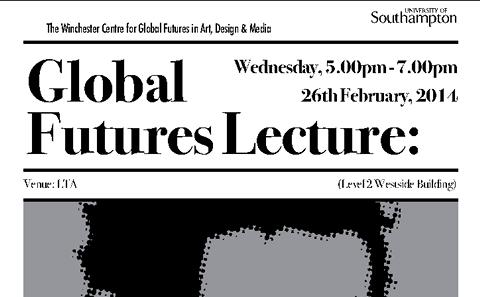Global Futures Speaker Series - Marco Pedroni Event

- Time:
- 17:00 - 19:00
- Date:
- 26 February 2014
- Venue:
- Guildhall, Winchester
For more information regarding this event, please email Dr Victoria Walters at v.m.walters@soton.ac.uk .
Event details
Fashion as Culture or Fashion as Industry? Yes, Please!
Abstract:
Given the choice between defining fashion as culture or as an industry, one might quote Groucho Marx’s humorous response to the mundane question ‘Tea or coffee?’: ‘Yes, please’, was his answer. In this way we might escape (rhetorically, at least) the false choice between, on the one hand, a cultural view of fashion as a means of communication, a system of signs, a tool to create a social imaginary, and on the other an economic understanding of fashion as a manufacturing and retailing business only. At the same time, it is too easy to conceptualise the relation between the two poles by just stating that fashion is an expression of culture, maybe a form of art, translated into wearable and marketable items, and it is equally unsatisfying and vague to think of fashion as a system where tangible and intangible features are indissolubly linked. How does the relationship actually happen? To what extent, under which conditions, through which agents and processes does fashion work as a cultural industry?
Bio:
Dr. Marco Pedroni is a Cultural Sociologist working at the Università Cattolica of Milan. His work addresses issues around fashion and industry and has developed through publications he has authored and edited in the last few years. Coolhunting. Genesis of a heretical professional practice (FrancoAngeli, Milan, 2010, Italian version only), focuses on the work of so-called coolhunters or trendwatchers, who have extended the activity of forecasting conceived in the late 60s in the fashion industry to many other industries. In this sense, fashion acted as a creator of a cultural model of research about consumers’ desires and was able to match it with producers’ needs. Coolhunters are an example of ‘cultural intermediaries’, whose role is also discussed in a book edited by Pedroni entitled From Production to Consumption: The Cultural Industry of Fashion (ed., Interdisciplinary, Oxford, 2013), together with the features that make fashion a space where a cultural object generated in a specific social world acquires immaterial meanings by crossing the phases of design, production, communication and consumption. The fluctuation between the cultural and the economic content of fashion is also visible in the question ‘Is fashion art?’ and this is the subject of a volume edited by Pedroni and P. Volonté entitled Fashion and Art (FrancoAngeli, Milan, 2012, Italian version only); a scientific article on this topic will be soon available in Poetics). Here, Pedroni discusses how the blurring line between the two areas can generate several types of relationship. The common theoretical underpinning of the three volumes is a Bourdieusian view of fashion as a social field where different agents cooperate or fight for a stake, by generating a game whose rules are both meaningful for the players and incomprehensible to those who do not take part in it.